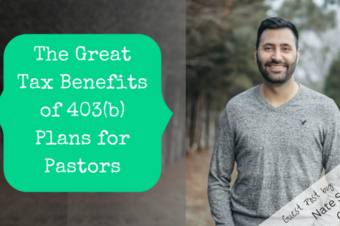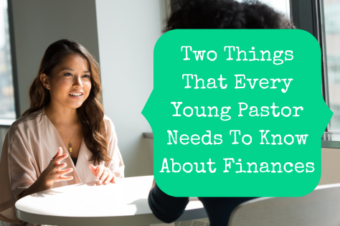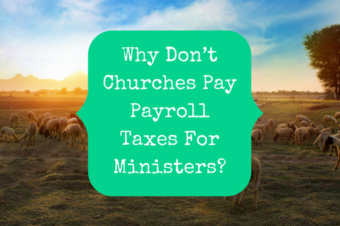
Yes.
There you have it, shortest blog post ever.
But in all seriousness, this is an important matter that can make a huge difference during your retirement. If you didn’t take saving for retirement seriously during your early years, even just receiving a little help from the Social Security Administration could make a big impact your monthly income in retirement.
Sounds great. So how does it work? Well, there are two ways:
1. Non-Ministerial Work Credit
Chances are, your very first paying job wasn’t as a licensed minister. Most pastors start out in the secular workforce, at least while they are in school. Others work for awhile before taking a pastoral position or continue to work on the side while pastoring.
For all of your non-ministerial work, you paid into Social Security and earned “credits” towards receiving benefits. For a more in-depth look into how Social Security works, read this post. Basically, you need to work a minimum of 10 years while earning a minimum amount ($6,040 in 2022) that is updated every year. Once you’ve done that, you are eligible to receive Social Security retirement benefits.
Taking a ministerial exemption and opting out of Social Security does not negate the non-ministerial work you have done and what you have paid into the system already. It only means that you don’t get credit for the ministerial income you earn. Even low wages for 13 years can earn you up to $602 a month in retirement, as seen in this example.
Don’t have enough non-pastoral income? There is another way that you could be eligible for Social Security benefits in retirement: your spouse.
2. Spousal Benefit
If your spouse is eligible for retirement benefits based on their work history, then you are eligible for a spousal benefit. The spousal benefit is fifty percent of the full retirement benefit earned by the working spouse.
The spousal benefit was designed for families in which one parent stays home to raise children. Since no one pays you to care for your own kids, stay-at-home parents do not pay into Social Security. They do, however, provide a valuable service to society and enable their spouse to work, earn, and pay into Social Security. Therefore, to care for stay-at-home parents, the Social Security Administration provides the spousal benefit.
Pastors with working spouses can take advantage of the spousal benefit, even though they are not who the program is designed for. Your spouse doesn’t even have to be alive to help you out. Even after the working spouse has passed away, the survivor can still receive their spousal benefit. In fact, even if you are divorced, as long as you were married for 10 years and haven’t remarried, you are still eligible for the spousal benefit.
Understand The Impact Of Opting Out
So, just opting out of Social Security doesn’t automatically mean that you won’t be able to receive benefits. However, opting out will have a great impact on not only the retirement benefits you receive but a lot more as well. It is vital that you completely understand the consequences of opting out of Social Security. Follow that link to read about the true cost of opting out, since Social Security goes far beyond just retirement. If you want a step-by-step guide for how to opt out of Social Security, follow that link.




20 Responses
Scott Johnson
June 24, 2019Amy- This is the first that I’ve heard that I may be able to take spousal Social Security support- based upon my wife’s income – even though I opted out of Social Security back in 1986. I’m due to retire in about six years. This would make a huge difference for us.
Have you known anyone who has been able to actually do this? I would love to hear from them.
Scott
Amy
June 24, 2019Readers, does anyone have experience with this that they can share with Scott?
DYER HARBOR
August 7, 2019Amy what about Medicare for those of us who opted out?
Amy
August 12, 2019Dyer,
You are eligible for Medicare, you just have to pay for Part A. You can read more about it here: https://pastorswallet.com/medicare-works-pastors-opted-social-security/
Dyer Harbor
August 13, 2019This is very helpful! I have one follow up question..when you wrote this…
Just like with Social Security retirement benefits, you can receive discounted or free Medicare Part A premiums based on your spouse’s work history. First, you must have been married for at least one year. Second, you must be at least age 65. Third, your spouse with an eligible work history must be at least age 62. If your spouse is too young, you will have to pay the premiums only until he or she reaches age 62.
This will be my situation in a few more years. How can I find out if my my premiums will be free or discounted? In order to prepare better?
Amy
August 16, 2019Dyer, whether the premiums are free or discounted will depend on how many quarters your spouse has worked. The Medicare website here https://www.medicare.gov/your-medicare-costs/medicare-costs-at-a-glance shows the costs based on the number of quarters earned. You could also request an estimate from the Social Security administration. As you plan, remember that costs can change from year to year, though they don’t usually change by a lot.
Dyer
August 17, 2019You have been very helpful- I appreciate your help!
Amy
August 27, 2019My pleasure!
Dan
January 23, 2020Is there any official statement from Social Security to validate that ministers who opt out can qualify for spousal Social Security income and medicare through the work of their spouse? Thank you. Dan
Amy
January 27, 2020Dan, this website describes spousal benefits: https://www.ssa.gov/planners/retire/applying6.html Also, the operations manual for the Social Security Administration clearly states that opting out of Social Security does not prevent a pastor from enrolling in Medicare: https://secure.ssa.gov/apps10/poms.nsf/lnx/0301802063
Charlie
February 28, 2022Amy,
I receive SSDI due to military trauma. Will opting out effect receiving SSDI benefits?
Thanks
Amy
March 1, 2022Charlie, opting out should not affect any benefits that you’ve already earned. One thing to watch out for is that the housing allowance does count as net earnings from self-employment for SSDI benefits if you’re still working (it doesn’t count as earnings if you’re retired).
Fr. Tom
April 12, 2022I worked for 30 at a secular job, retired, and then was ordained and work fulltime as a pastor. I understand that if I have SS credits (and I do) that I get to collect a SS benefit even if I opt out of SS as a pastor. That all makes sense but having been in the corporate world all these years, I like documentation. Are you able to show me in IRS documentation that opting out later as a minister does not impact my SS benefits when I decided to collect them?
Amy
April 24, 2022Fr. Tom, unfortunately I don’t know of anywhere that it is spelled out. My understanding is based on the fact that nowhere does it say that opting out for ministerial income forfeits previously earned benefits, Form 4361 that is used to opt out makes it clear that opting out only applies to ministerial income, and I’ve seen numerous pastors who have opted out have no trouble collecting benefits.
Heidi Brausch
January 17, 2023I find this blog post and the comments I read to be quite disturbing. Don’t you all realize that when you ‘opted out’ you were not just making a savvy financial decision. You were certifying the following by signing the form (this statement is directly copied from Form 4361): ” I certify that I am conscientiously opposed to, or because of my religious principles I am opposed to, the acceptance (for services I perform as a minister, member of a religious order not under a vow of poverty, or Christian Science practitioner) of any public insurance that makes payments in the event of death, disability, old age, or retirement; or that makes payments toward the cost of, or provides services for, medical care. (Public insurance includes insurance systems established by the Social Security Act.)”
You should not be collecting after opting out because it is unethical. You were only permitted to opt outto begin with because of a religious belief that you are opposed to THE ACCEPTANCE OF public insurance. So, if you do decide to collect – you’ll also need to repent for dishonesty. I think that the fact that so many ministers across this land are turning a blind eye to this is not unnoticed by God.
Fr. Tom
January 17, 2023Heidi,
I think you may be misunderstanding something here. Opting out of SS is only for the salary earned as a minister. If one opts out of that, then, one cannot later collect social security benefits. There is no moral or ethical question in this. If one does not pay SS taxes as a minister, then, one cannot later collect SS benefits from that work– period.
Now, I retired from a career in the corporate world. I paid the maximum possible SS tax each year because I was highly compensated. After I retired, I became a Catholic priest, and I decided to opt out of SS for the salary that I am paid as a priest. My salary is extremely small, and besides this, I spend it on the parish, which is poor. In any case, it is totally ethical, as well as within the law, for me to collect SS from my corporate career. In my corporate career, I paid a significant sum in SS taxes, far more than most people do. Collecting SS benefits (and Medicare) is something that I have earned. I do not wish to collect SS benefits against my salary as a minister, but it is owed to me from my career.
Thus, there are two separate things operating here. On the one hand, the SS benefits that I have earned by paying SS and the SS taxes/benefit that I have opted out of as a minister.
Now, regarding a minister who opted out, but is collecting on his spouse’s SS, this too is totally ethical. The minister is not collecting based on his service as a minister, but on the work and taxes paid by his spouse. His spouse eared this spousal benefit. I don’t know the SS laws and benefits as it relates to spouses, but if this is a benefit, then, there is nothing unethical involved. Suppose that one’s spouse never worked and so never paid SS benefits and is thus not entitled to SS benefits? That spouse is not doing anything unethical by collect against his spouse’s benefits, if that is a prevision in SS law.
Again, I think you are misunderstanding this, and unfortunately, have jumped to conclusions regarding the honesty of those ministers who have opted out of SS.
Sue
May 6, 2023One of our tax clients is a retired pastor who opted out of SS in 1981 with an exemption but then revoked that exemption in 1986 when there was a law passed that gave a couple of years allowing for revoking your opt out. She paid her SS and Medicare taxes each year on her Form SE of her tax return from 1987 through 2021. Now she is retired and applied for SS benefits. The SSA does show all of her earnings correctly but they told her that they do not see than she revoked her exemption in 1986. SSA says that she must get a copy of the 1986 Form 2031 (revokes the exemption/opt out) that was filed with IRS. She has no copies from 1986 and the IRS no longer has any copies or records from 1986. What can she do?
I am thinking the SSA agent is not very knowledgeable because it seems that if the earnings are their on the record, that means she paid the tax and surely they must have had the Form 2031. If she paid the tax, she must have revoked her exemption. But again, if the SSA did not record it in their system correctly, then what can she do?
Her husband was also a pastor and did the same thing but he has been receiving his SS benefits for 3 years with no problem.
Amy
May 8, 2023Sue, unfortunately it is your client’s responsibility to maintain the records. However, I don’t see how the SSA can justify denying her benefits when she clearly paid into the system. I would escalate the matter to a subject matter expert at the SSA. If they still want to deny her benefits, have them pay back all of the taxes she’s paid plus interest! (I’m joking, I doubt they would do this.) If she continues to have trouble, consider getting her local congressional representative involved. I have heard from people who were initially denied benefits and only got them after getting a congressman involved.
London Hong
November 20, 2023Hi Amy,
Your blog is very informative regarding SS rules for pastors.
I have a question: If a pastor has been working in a church and paying taxes with SS for 10 years but decides to opt out, can they still receive SS benefits based on the contributions made before opting out?
If you have any reference links or information on this, I would greatly appreciate it.
Thank you in advance for your assistance!
Amy
November 29, 2023London, there is a deadline to opt out that is about 2 years (https://pastorswallet.com/what-is-the-deadline-for-pastors-to-opt-out-of-social-security-with-form-4361/). So, if someone has been pastoring for 10 years, it is too late and they can’t opt out. However, if someone were working in a church in a non-ministerial position and then became a pastor and opted out, what they had already paid in would count towards benefits.